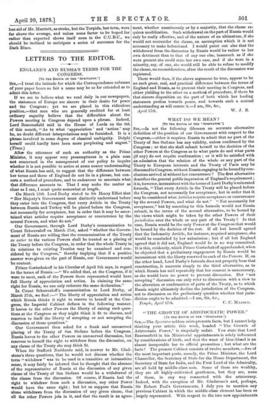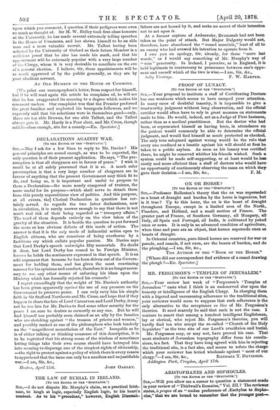"THE GROWTH OF ARISTOCRATIC POWER."
[TO THE EDITOR OF Till " SPEOTATOR.1 SIR,—The Spectator seldom misrepresents facts, but I cannot help thinking your article this week, headed " The Growth of Aristocratic Power," is singularly unfair. You state that Lord Beaconsfield in his Ministerial appointments is solely influenced by considerations of birth, and that the want of blue-blood is an almost insuperable bar to official promotion ; but what are the facts ? The present Cabinet consists of twelve members,—five of the most important posts, namely, the Prime Minister, the Lord Chancellor, the Secretary of State for the Home Department, the Secretary of State for India, and the First Lord of the Admiralty, are all held by middle-class men. Some of them are wealthy, they are all highly-cultivated gentlemen, but they are, none of them, in any way connected with the aristocracy. Indeed, with the exception of Mr. Gladstone's and, perhaps, Sir Robert Peel's Governments, I defy you to mention any previous Cabinet in which the middle-class element has been so largely represented. With respect to the two new appointments upon which you comment, I question if their pedigrees were even no much as thought of. Sir M. W. Ridley took first-class honours at the University, he has made several extremely telling speeches in the House of Commons, and has shown himself to be an able man and a most valuable recruit. Mr. Talbot having been selected by the University of Oxford as their future Member is a sufficient proof that he also has made his mark, and that his appointment will be extremely popular with a very large number of the Clergy, whom it is very desirable to conciliate on the eve of a general election. I believe, Sir, these appointments will be as much approved of by the public generally, as they are by your obedient servant, AN OLD MEMBER OF THE HOUSE OF COMMONS.
[We print our correspondent's letter, from respect for himself, but if he will read again the article he complains of, he will see that he has exaggerated its meaning to a degree which makes his comment useless. Our complaint was that the Premier preferred the great families and neglected his bourgeois followers, and we expressly said that his selections were in themselves good—only, there are ten able Browns, for one able Talbot, and the Talbot always gets it. Mr. Hardy is a Peer elect, and Mr. Cross, though middle-class enough, sits for a county.—En. Spectator.]



































 Previous page
Previous page